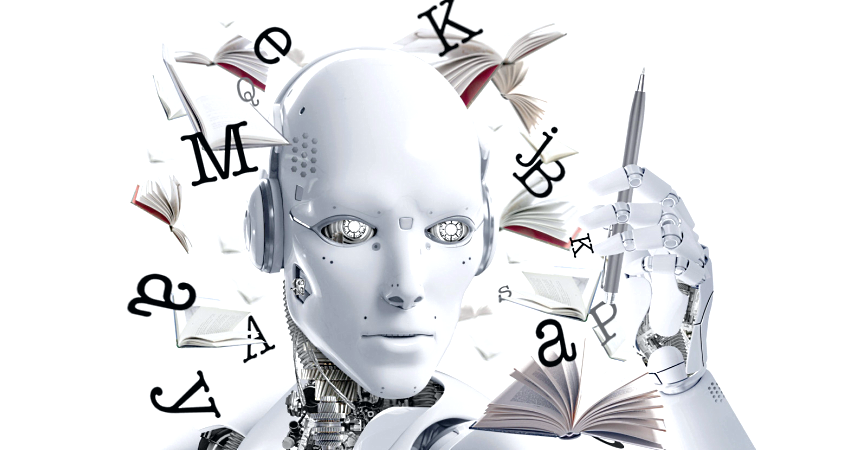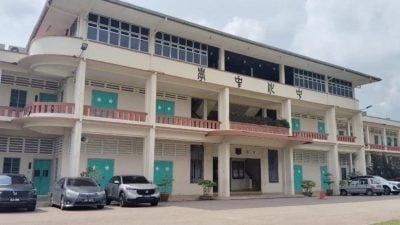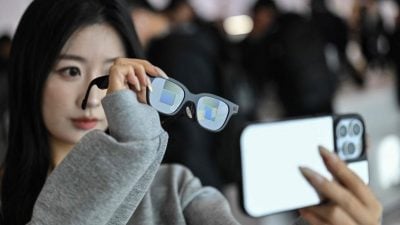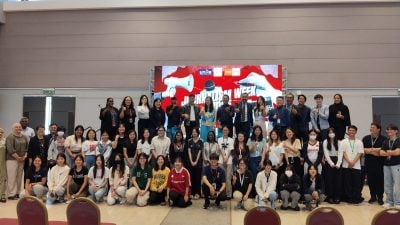 JAKARTA: While many in the education sector are still grappling with how to keep generative artificial intelligence (AI) out of schools, students in Pekanbaru, Riau, are actively using it as part of a pioneering local government program.
JAKARTA: While many in the education sector are still grappling with how to keep generative artificial intelligence (AI) out of schools, students in Pekanbaru, Riau, are actively using it as part of a pioneering local government program.
“AI is key to preparing for the future in Riau and Indonesia, thereby realizing the vision of a ‘Golden Indonesia’ that progresses toward an anticipated advanced nation,” Governor Syamsuar said during the program’s launch last October, as reported in a press release by Universitas Insan Cita Indonesia (UICI).
The Jakarta-based university developed the AI-based education program that is now being piloted in select high schools in Riau.
In these schools, students study a curated curriculum at their own pace and preferred location, whether at home or in a cafe, using personal computers. Teachers closely monitor their progress.
UICI is a trailblazer in tech-powered education in Indonesia.
It describes itself as the country’s first “fully digitalized” university and uses an AI Digital Simulator Teaching Learning System that enables students to study anytime and anywhere, with or without an internet connection.
In Semarang, Central Java, Binus School has also pioneered the use of AI and augmented reality to bring abstract subjects to life.
Within dedicated laboratories, students can explore complex subjects like the solar system in an accessible, visually appealing manner, and immerse themselves in an animated prehistoric world to learn about dinosaurs.
These initiatives signal a potential new tech-powered revolution in Indonesian education.
The speed of this revolution is contingent on overcoming several challenges.
During the pandemic, the education technology start-up sector flourished, as students received government funds to take online courses.
When the funding dried up post-pandemic and students returned to classrooms, the excitement over EdTech start-ups fizzled.
But technology to improve learning is not exclusive to start-ups as long as traditional educational institutions embrace them.
Yandra Arkeman, a professor in agro-industrial technology at the Bogor Agricultural University (IPB), envisions AI and the metaverse revolutionizing learning: A world where physical co-location of teachers and students is unnecessary, where old biology teaching aids become obsolete.
“Education is stepping into the third dimension,” he asserts.
Nevertheless, Orbit Future Academy president commissioner Ilham Akbar Habibie notes a persistent emphasis on physical presence in Indonesian schools.
Digitally sharing educational resources could address the uneven distribution of quality education across the archipelago.
Despite the government’s Merdeka Belajar initiative, which allows students to take online courses from other universities, territorial restrictions in high school enrollment and non-recognition of asynchronous online education hinder the growth of online or distance learning.
Arkeman stressed the urgent need for regulations that can keep pace with technological leaps, especially in education.
Teachers also need to be retrained to be able to fully unleash the power of the internet in classrooms.
And then there are the concerns over cheating, or how students ask AI tools like ChatGPT to answer their online tests for them.
To address this, the late Hasri Ainun Habibie’s Orbit Foundation created Orbit360, an educational service supporting the digital transformation of schools.
Orbit360 offers an online examination feature that minimizes the possibility of students engaging in dishonest practices by imposing time penalties when the system detects that the student is trying to find the answer elsewhere.
Aside from leveraging technology to improve education, Ilham emphasized that Indonesia also has to improve education about technology.
Ilham believes that the Science, Technology, Engineering, Arts and Mathematics (STEAM) curricula, along with project-based learning (PBL) that applies theoretical knowledge to real-world challenges, should be mandatory to enhance students’ understanding and application of science and technology in Indonesia.
He highlighted the importance of digital literacy in the educational context, pointing out that students tend to have higher digital literacy levels compared to parents or teachers, depending on their generation.
Digital literacy is considered a significant obstacle because, without adequate understanding, stakeholders may not perceive the relevance and benefits of technology-based education systems.
In addition to digital literacy, Ilham notes other barriers in education technology, including potential
additional costs. Despite the increased effectiveness and efficiency of technology use, some parties may be reluctant to change because of familiarity with traditional systems.
Arkeman also expressed his hopes for the development of the education technology industry in Indonesia.
“I hope that in the future, Indonesia can become a producer of education technology, with innovations that can help the country become a leader in digital technology, not just a consumer,” he said.
ADVERTISEMENT
ADVERTISEMENT








































